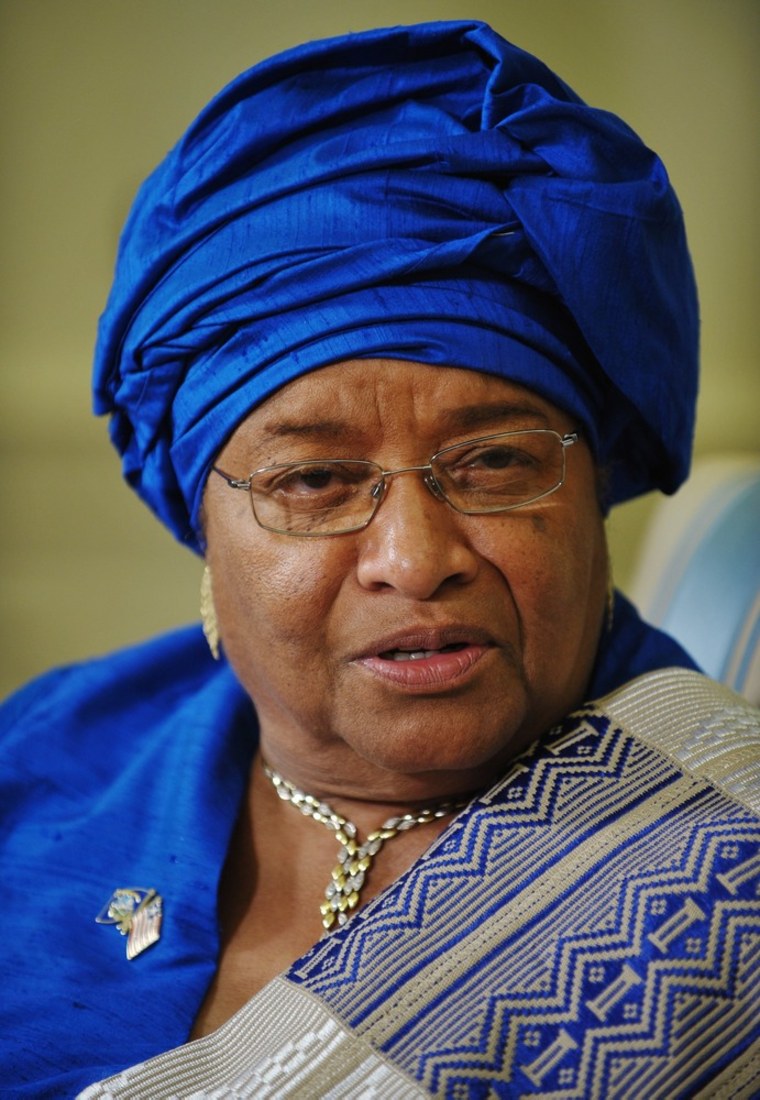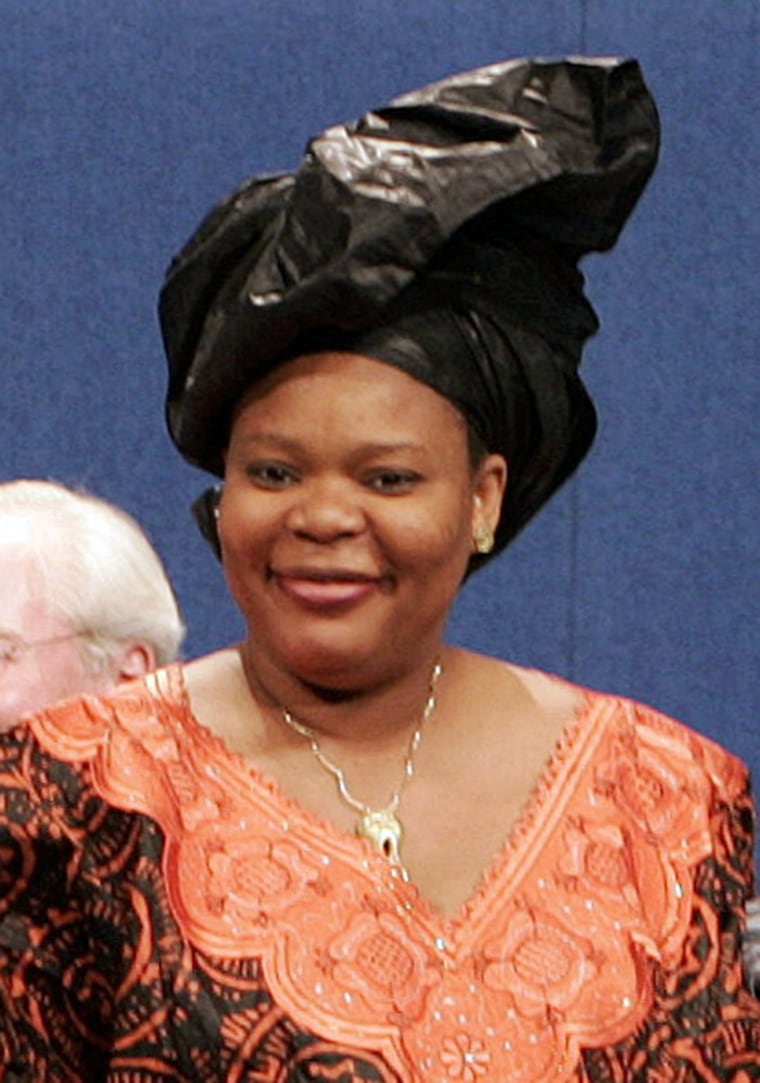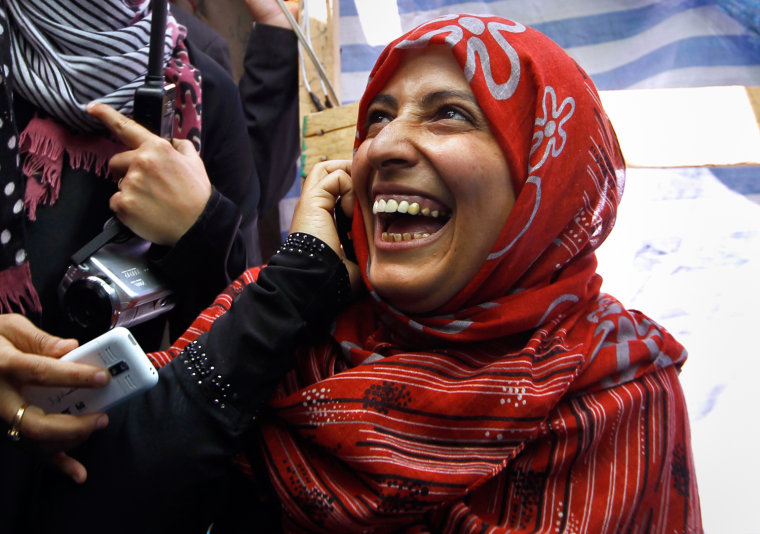Leymah Gbowee confronted armed forces in Liberia to demand that they stop using rape as a weapon. Ellen Johnson Sirleaf became Africa's first woman to win a free presidential election. Tawakkul Karman began pushing for change in Yemen long before the Arab Spring. They share a commitment to women's rights in regions where oppression is common, and on Friday they shared the Nobel Peace Prize.
The Norwegian Nobel Committee honored women for the first time in seven years, and in selecting Karman it also recognized the Arab Spring movement championed by millions of often anonymous activists from Tunisia to Syria.
Prize committee chairman Thorbjoern Jagland said it would have been difficult to identify all the movement's leaders, and that the committee was making an additional statement by selecting Karman to represent their cause.
"We have included the Arab Spring in this prize, but we have put it in a particular context," Jagland told reporters. "Namely, if one fails to include the women in the revolution and the new democracies, there will be no democracy."
Karman is the first Arab woman ever to win the peace prize, which includes a 10 million kronor ($1.5 million) award that will be divided among the winners. No woman or sub-Saharan African had won the prize since 2004, when the committee honored Wangari Maathai of Kenya, who mobilized poor women to fight deforestation by planting trees.
"I am very, very happy about this prize," said Karman, who has been campaigning for the ouster of Yemen's authoritarian President Ali Abdullah Saleh since 2006. "I give the prize to the youth of revolution in Yemen and the Yemeni people."
'Iron Woman'
Jagland noted that Karman's work started before the Arab uprisings.
"Many years before the revolutions started she stood up against one of the most authoritarian and autocratic regimes in the world," he told reporters.
Yemen is an extremely conservative society but a feature of the Arab Spring uprising there has been a prominent role for women who turned out for protests in large numbers.
A resident of Taiz, a city in southern Yemen that is a hotbed of resistance against Saleh's regime, Karman is a journalist and member of Islah, an Islamic party. Her father is a former legal affairs minister under Saleh.
On Jan. 23, Karman was arrested at her home for leading anti-Saleh protests. After widespread protests against her detention — it is rare for Yemeni women to be taken to jail — she was released early the next day.
Karman has been dubbed "Iron Woman, "The Mother of Revolution" and "The Spirit of the Yemeni Revolution" by fellow protesters. During a February rally in Sanaa, she told the AP: "We will retain the dignity of the people and their rights by bringing down the regime."
Liberia was 'going to hell'
Sirleaf, 72, became Africa's first democratically elected female president in 2005. She has a master's degree in public administration from Harvard University and has held top regional jobs at the World Bank, the United Nations and within the Liberian government.

Sirleaf said Friday the award was recognition of the West African state's "many years of struggle for justice, peace, and promotion of development" since a brutal civil war, Reuters reported.
"I believe we (Gbowee and I) both accept this on behalf of the Liberian people, and the credit goes to the Liberian people," she told reporters outside her private residence in the capital Monrovia.
"This gives me a stronger commitment to work for reconciliation," Sirleaf added. "Liberians should be proud."
African and international luminaries welcomed the news. Many had gathered in Cape Town, South Africa on Friday to celebrate Nobel peace laureate Archbishop Desmond Tutu's 80th birthday.
"Who? Johnson Sirleaf? The president of Liberia? Oooh," said Tutu, who won the peace prize in 1984 for his nonviolent campaign against white racist rule in South Africa.
"She deserves it many times over. She's brought stability to a place that was going to hell," he said.
'A force of nature'
U2 frontman Bono — who has figured in peace prize speculation in previous years — called Sirleaf an "extraordinary woman, a force of nature and now she has the world recognize her in this great, great, great way."
In elections in 1997, Sirleaf ran second to warlord-turned-president Charles Taylor, who many claimed was voted into power by a fearful electorate. Though she lost by a landslide, she rose to national prominence. Taylor was later indicted on war-crimes charges.
Sirleaf was seen as a reformer and peacemaker in Liberia when she took office six years ago. She is running for re-election Tuesday and opponents in the presidential campaign have accused her of buying votes and using government funds to campaign. Her camp denies the charges.
In a 2005 interview with The Associated Press, Sirleaf said she hoped young girls would see her as a role model and be inspired. "I certainly hope more and more of them will be better off, women in Liberia, women in Africa, I hope even women in the world," she added.
"If you're competing with men as a professional, you have to be better than they are ... and make sure you get their respect as an equal," Sirleaf said. "It's been hard. Even when you gain their acceptance, it's in a male-dominated away. They say, 'Oh, now she's one of the boys."
Buttons from her presidential campaign say it all: "Ellen — She's Our Man."
The committee cited Sirleaf's efforts to secure peace in her country, promote economic and social development and strengthen the position of women.
Jagland said the committee didn't consider the upcoming election in Liberia when it made its decision.
"We cannot look to that domestic consideration," he said. "We have to look at Alfred Nobel's will, which says that the prize should go to the person that has done the most for peace in the world."

Liberia was ravaged by civil wars for years until 2003. The country is still struggling to maintain a fragile peace with the help of U.N. peacekeepers.
'Fair and straight'
Gbowee organized a group of Christian and Muslim women to challenge Liberia's warlords.
In 2009 she won a Profile in Courage Award, an honor named for a 1957 Pulitzer Prize-winning book written by John F. Kennedy, for her work in emboldening women in Liberia.
Gbowee was honored for mobilizing women "across ethnic and religious dividing lines to bring an end to the long war in Liberia, and to ensure women's participation in elections."
Gbowee, a mother of five, works in Ghana's capital as the director of Women Peace and Security Network Africa.
The group's website says she also won a 2007 Blue Ribbon Award from Harvard University and was the central character of an award-winning documentary called "Pray the Devil Back to Hell."
"I know Leymah to be a warrior daring to enter where others would not dare," said Gbowee's assistant, Bertha Amanor. "So fair and straight, and a very nice person."
Amanor told msnbc.com by phone that Gbowee was "excited, close to tears and ... happy" after hearing she had won the prize, but was not immediately available to comment.
Amanor said the award would help Gbowee's group as "now we are out on the international scene, people who have never heard of you, know who you are ... now we have an icon."
"There's a lot expected from her and her organization," she said, saying it would be a "challenge" to live up to those expectations.
The group, known as Wipsen-Africa, currently has programs in six west African countries, Ghana, Liberia, Sierra Leone, Cote d'Ivoire, Nigeria and Togo.
Amanor said she thought the other two recipients deserved the award, saying becoming the first female president of an African country was an achievement. "It's not an easy task for a woman to come this far," she said.
